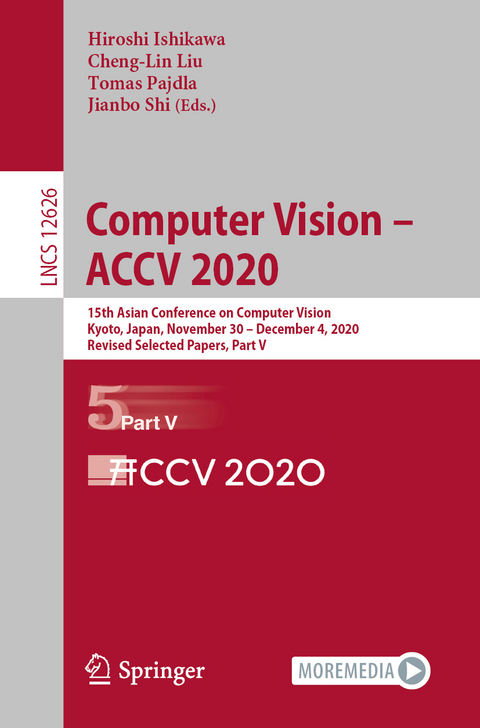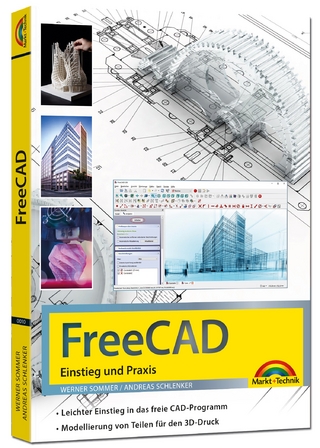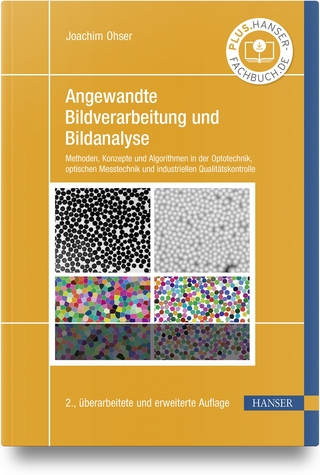
Computer Vision – ACCV 2020
Springer International Publishing (Verlag)
978-3-030-69540-8 (ISBN)
The total of 254 contributions was carefully reviewed and selected from 768 submissions during two rounds of reviewing and improvement. The papers focus on the following topics:
Part I: 3D computer vision; segmentation and grouping
Part II: low-level vision, image processing; motion and tracking
Part III: recognition and detection; optimization, statistical methods, and learning; robot vision
Part IV: deep learning for computer vision, generative models for computer visionPart V: face, pose, action, and gesture; video analysis and event recognition; biomedical image analysis
Part VI: applications of computer vision; vision for X; datasets and performance analysis
*The conference was held virtually.
Face, Pose, Action, and Gesture.- Video-Based Crowd Counting Using a Multi-Scale Optical Flow Pyramid Network.- RealSmileNet: A Deep End-To-End Network for Spontaneous and Posed Smile Recognition.- Decoupled Spatial-Temporal Attention Network for Skeleton-Based Action-Gesture Recognition.- Unpaired Multimodal Facial Expression Recognition.- Gaussian Vector: An Efficient Solution for Facial Landmark Detection.- A Global to Local Double Embedding Method for Multi-person Pose Estimation.- Semi-supervised Facial Action Unit Intensity Estimation with Contrastive Learning.- MMD based Discriminative Learning for Face Forgery Detection.- RE-Net: A Relation Embedded Deep Model for AU Occurrence and Intensity Estimation.- Learning 3D Face Reconstruction with a Pose Guidance Network.- Self-Supervised Multi-View Synchronization Learning for 3D Pose Estimation.- Faster, Better and More Detailed: 3D Face Reconstruction with Graph Convolutional Networks.- Localin Reshuffle Net: Toward Naturally and Efficiently Facial Image Blending.- Rotation Axis Focused Attention Network (RAFA-Net) for Estimating Head Pose.- Unified Application of Style Transfer for Face Swapping and Reenactment.- Multiple Exemplars-based Hallucination for Face Super-resolution and Editing.- Imbalance Robust Softmax for Deep Embedding Learning.- Domain Adaptation Gaze Estimation by Embedding with Prediction Consistency.- Speech2Video Synthesis with 3D Skeleton Regularization and Expressive Body Poses.- 3D Human Motion Estimation via Motion Compression and Refinement.- Spatial Temporal Attention Graph Convolutional Networks with Mechanics-Stream for Skeleton-based Action Recognition.- DiscFace: Minimum Discrepancy Learning for Deep Face Recognition.- Uncertainty Estimation and Sample Selection for Crowd Counting.- Multi-Task Learning for Simultaneous Video Generation and Remote Photoplethysmography Estimation.- Video Analysis and Event Recognition.- Interpreting Video Features: A Comparison of 3D Convolutional Networks and Convolutional LSTM Networks.- Encode the Unseen: Predictive Video Hashing for Scalable Mid-Stream Retrieval.- Active Learning for Video Description With Cluster-Regularized Ensemble Ranking.- Condensed Movies: Story Based Retrieval with Contextual Embeddings.- Play Fair: Frame Contributions in Video Models.- Transforming Multi-Concept Attention into Video Summarization.- Learning to Adapt to Unseen Abnormal Activities under Weak Supervision.- TSI: Temporal Scale Invariant Network for Action Proposal Generation.- Discovering Multi-Label Actor-Action Association in a Weakly Supervised Setting.- Reweighted Non-convex Non-smooth Rank Minimization based Spectral Clustering on Grassmann Manifold.- Biomedical Image Analysis.- Descriptor-Free Multi-View Region Matching for Instance-Wise 3D Reconstruction.- Hierarchical X-Ray Report Generation via Pathology tags and Multi Head Attention.- Self-Guided Multiple Instance Learning for Weakly Supervised Thoracic Disease Classification and Localizationin Chest Radiographs.- MBNet: A Multi-Task Deep Neural Network for Semantic Segmentation and Lumbar Vertebra Inspection on X-ray Images.- Attention-Based Fine-Grained Classification of Bone Marrow Cells.- Learning Multi-Instance Sub-pixel Point Localization.- Utilizing Transfer Learning and a Customized Loss Function for Optic Disc Segmentation from Retinal Images.
| Erscheinungsdatum | 01.03.2021 |
|---|---|
| Reihe/Serie | Image Processing, Computer Vision, Pattern Recognition, and Graphics | Lecture Notes in Computer Science |
| Zusatzinfo | XVIII, 706 p. 5 illus., 1 illus. in color. |
| Verlagsort | Cham |
| Sprache | englisch |
| Maße | 155 x 235 mm |
| Gewicht | 1092 g |
| Themenwelt | Informatik ► Grafik / Design ► Digitale Bildverarbeitung |
| Informatik ► Theorie / Studium ► Künstliche Intelligenz / Robotik | |
| Schlagworte | Applications • Artificial Intelligence • biomedical image analysis • Computer Networks • Computer Science • computer vision • conference proceedings • Correlation Analysis • face recognition • Image Analysis • image coding • Image Processing • image reconstruction • Image Segmentation • Informatics • machine learning • Neural networks • pattern recognition • Research • Signal Processing |
| ISBN-10 | 3-030-69540-9 / 3030695409 |
| ISBN-13 | 978-3-030-69540-8 / 9783030695408 |
| Zustand | Neuware |
| Haben Sie eine Frage zum Produkt? |
aus dem Bereich


